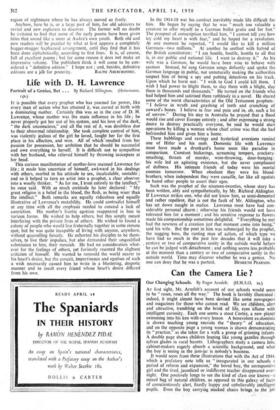Life with D. H. Lawrence
Portrait.of a Genius, But ... By Richard Aldington. (Heinemann.
ss.) IT is possible that every prophet who has yearned for power, like every-man of action who has attained it, was cursed at birth with a dominating mother. Certainly this was so in the case of D. H. Lawrence, whose mother was the main influence in his life ; he never properly got her out of his, system, and his love of the dark, " the dark unconscious," and all the rest of it was doubtless due to their abnormal relationship. She took complete control of him, was violently jealous of the girl he loved, fought her for the first place in his affection, and won. All of which'resulted from her passion for possession, her ambition that he should be successful and owe everything to herself. It is difficult not to sympathise with her husband, who relieved himself by throWing saucepans at her head.
This curious manifestation of -mother-love maimed Lawrence for life ; it made him' uncertain of himself, awkward in his dealings with others, morbid in his attitude to sex, incalculable, unstable ; and so it helped to turn an artist into a prophet, a clear observer into a woolly thinker. " As for me, .I trust entirely to the intellect," he once said. With as much certitude he later declared: " My great religion is a belief in the blood, the flesh, as being wiser than the intellect." Both remarks are equally ridiculous and equally illustrative of Lawrence's mutability. He could contradict himself at any time with all the emphasis needed to conceal a lack of conviction. His mother's frantic egotism reappeared in him in various forms. He wished to help others, but this simply meant interfering with the private lives of others. He wished to found a colony of people, who would live fraternally together in some remote spot, but he was quite incapable of living with anyone, anywhere, without quarrelling fiercely. He exhorted his disciples to be them- selves, to live their impulses, but also demanded their unqualified submission to him, their messiah. He had no consideration what- ever for the feelings of others, yet furiously resented the slightest criticism of himself. He wanted to remould the world nearer to his heart's desire, but the conceit, impertinence and egotism of such a wish necessarily caused him to write in a blustering, despotic manner and to insult every friend whose heart's desire differed from his own.
In the 1914-18 war his conduct inevitably made life difficult for him. He began by saying that he was " much too valuable a creature to offer myself to a German bullet gratis and for fun." The prospect of conscription terrified him, " I cannot tell you' how icy cold my heart is with fear," and he hoped for a revolution. At one moment he reported, " I would like to kill a million Germans—two millions." At another he seethed with hatred of the British constitution: ." I am hostile, hostile, hostile to all that is; in our public and national life. I want to destroy it." As his wife was a German, he would have been wise to behave with caution Instead, he' sang German songs defiantly and spoke the German language in public, not unnaturally making the authorities suspect him of being a spy and putting detectives on his track. Upon which he burst out: " I wish to God I could kill them. I wish I had power to blight them, to slay them with a blight, slay them in thousands and thousands." He turned'on the friends who had helped him and satirised them ruthlessly in a novel. He shared some of the worst characteristics of the Old .Testament prophets: " I believe in wrath and gnashing of teeth and crunching of coward's bones. I believe in fear and pain and in, oh, such a lot of sorrow." During his stay in Australia he prayed that a flood would rise and cover Europe entirely ; and after expressing a strong desire to destroy practically everyone, he said he would start operations by killing a woman whose chief crime was that she had befriended him and given him a home.
These babblings and ravings and hysterical aversions remind one of Hitler and his mob. Domestic life with Lawrence must have made a drunkard's home seem like paradise in comparison. Constant bickerings, screaming tempers, crockery- smashing, threats of murder, wine-throwing, door-banging: his wife led an agitating existence, but she never complained of dullness. His intimate friends of today were his mortal enemies tomorrow. When obedient they were his blood- brothers, when independent they were canaille, for like all egotists he hated other people to assert their egos.
Such was the prophet of the nineteen-twenties, whose story has been written, ably and sympathetically, by Mr. Richard Aldington. If Lawrence strikes one, who did not know him, as semi-demented and rather repellent, that is not the fault of Mr. Aldington, who has set down naught in malice. Lawrence must have had con- siderable personal u_ harm ; Otherwise his friends would not have tolerated him foi. a moment ; and his sensitive response to flowers made his coinpanionship sometimes delightful. " Everything he met had the newness of a:creation just that moment come into being," said his wife. But the poet in him was submerged by the prophet, the nagging boss, the ranting man of action, of which type we have had so much in the past few decades that it will take a century or two of comparative sanity in the outside -world before he can be judged with detachment ; and nothing seems less probable at the moment than a century or two of comparative sanity,in the outside world. Time may discover whether he was a genius. No
one can deny that he was a portent. HESKIETH PEARSON.






































 Previous page
Previous page